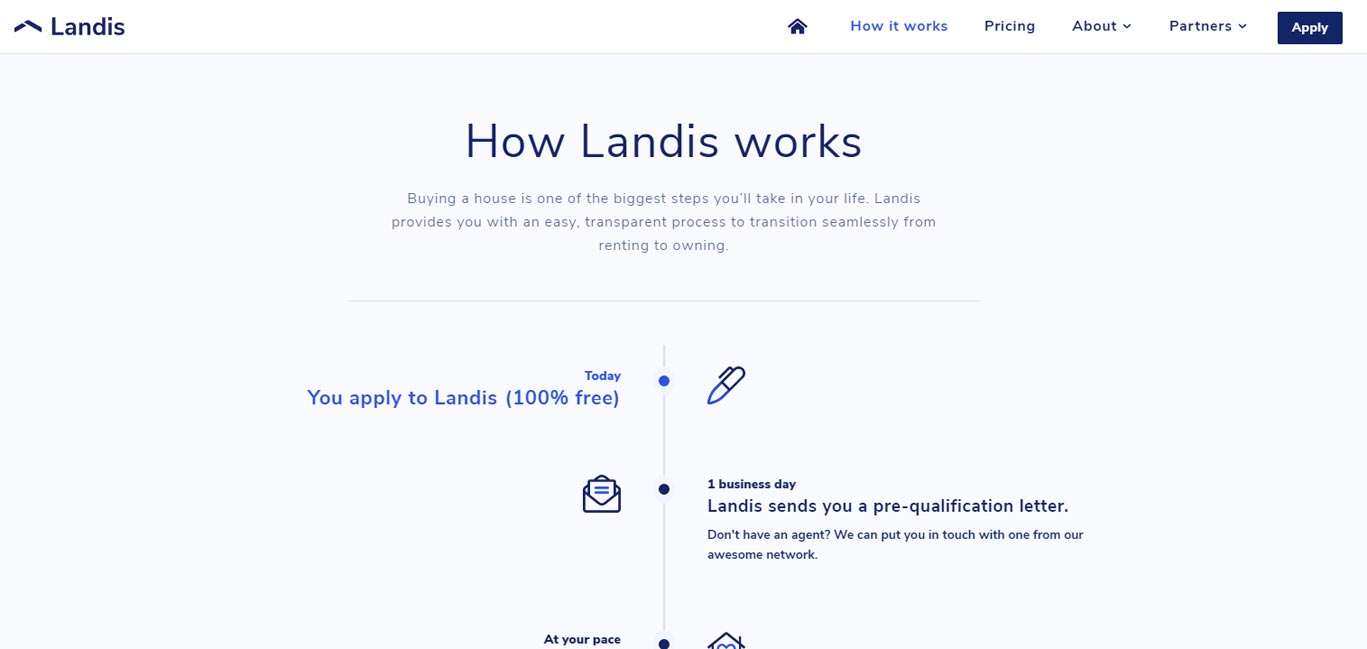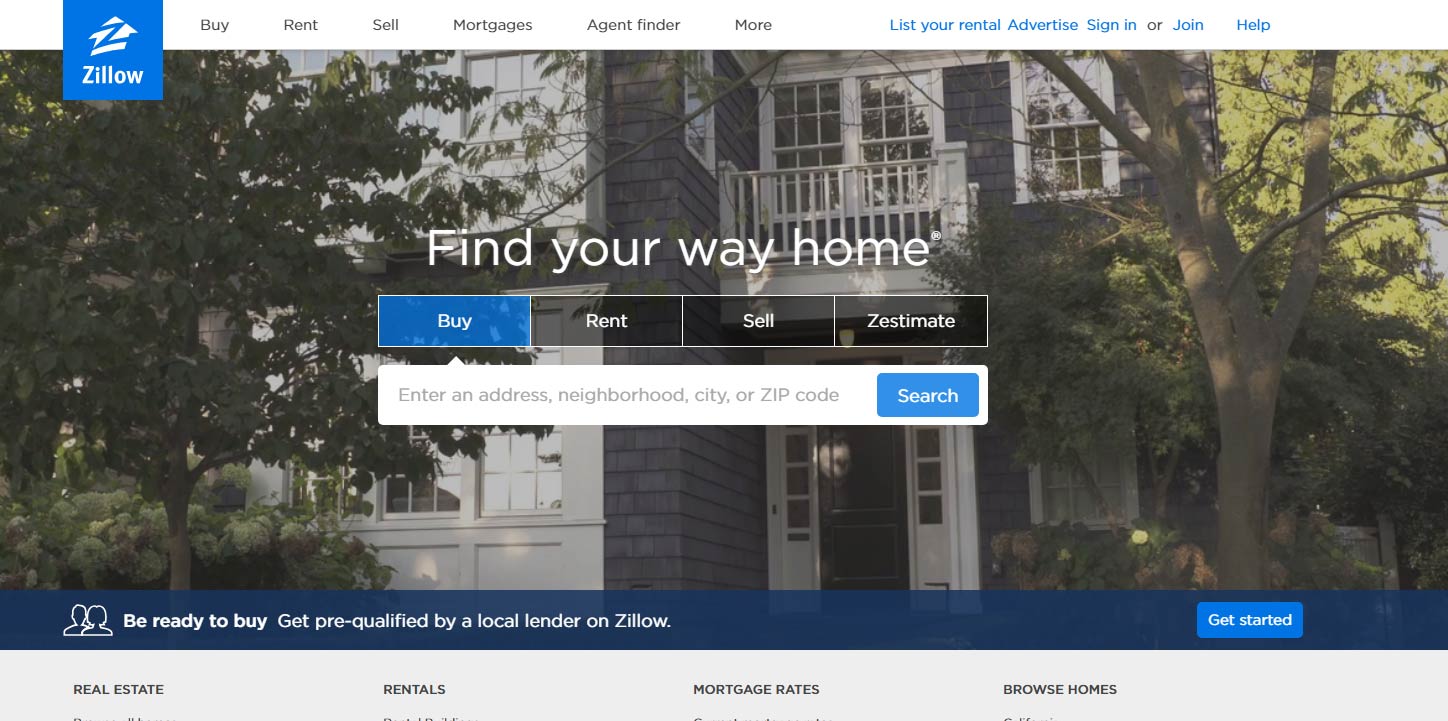Compare Landis.com and Zillow.com
For Buyers
Answer: Landis.com is a rent-to-own program that does not provide real estate services while Zillow.com is a Multiple Listing Services (MLS) aggregator
Buying with Landis
Landis is a rent-to-own program that purchases the home and then rents it out to you as a tenant. Landis claims to operate a one-year program for the tenants to buy the property once they can afford a down payment. A common complaint with all rent-to-own programs is an inability of the tenant to secure a loan in time to purchase the property, at which point the tenant is either forced to walk away with a loss or continues to rent.
Landis may sometimes suggest that a customer reach out to someone (e.g. a lender) who can help them, but the company doesn’t make money from it, and only gives the info to the customer, not the customer's info to anyone else. Landis does not receive any referral fees from third parties (such as lenders, real estate brokers, etc.) and keenly guards customers' information. This is a refreshing approach that adds value to consumers. Landis states that: "companies at our stage don't have any incentive to charge hidden fees: growth and customer experience simply matter much more than revenue."
Landis Pricing
Landis revenue comes from the price of rent and a 3% increase between the price of the home when Landis buys it and the price it sells it to the tenant after a year.
Landis is silent on what happens in a situation when the price of the home drops before the tenant can buy it, or if the mortgage rates increase during the tenancy period. When consumers use Landis, they are unable to take advantage of a buyer’s commission rebate from a real estate agent because the company is the one actually buying the home.
Landis states that it receives "no rebates or commissions from agents, we pay agents their full commission, as though they were working with the customer."
When it comes to the cost of rent Landis says that "we're very upfront with our users that during the 12 months of the program, we are more expensive than owning, or even renting. That's because we need our customers to put money to the side for their down payment … our only revenue is market rent and 3% appreciation at the end of the year. The economics work out because we're in areas where average rents are high."
Listing Services
- This Service Does Not Represent Sellers
Buyer's Agent Services
- This Service Does Not Represent Buyers
Landis.com Editor's Review:
Landis program purchases the home and rents it to the tenant with an option to buy. Landis reviews full financial, credit, and work history of each potential tenant. Those few applicants who pass the screening may select a home within the allowed amount Landis sets. A tenant pays rent, a portion of which becomes a down payment to eventually buy the home. After a year, if the tenant decides to move out, Landis deducts half of the down payment amount saved, as an added fee. When purchasing a house from Landis, a tenant must and pay closing costs of the sale.
Landis has only enough cash on hand (structured as debt) to place offers against a handful of properties. This is why the company likely rejects the majority of applications as a way to reduce risk. It is safe to assume that only a very small number of applications with Landis are approved.
According to the company, "lenders send us customers that want to buy a home but can't close on a loan. It could be due to a low credit score, insufficient down payment, a recent bankruptcy, self-employment, or some other reason."
To secure a mortgage on competitive terms is a primary and the best option to buy a home. Yes, the down payment is difficult, but adding Landis to the mix doesn't solve the overall affordability. Landis claims that owning a home is always cheaper than renting it, but Landis is a landlord.
There is nothing to substantiate that renting a home from Landis is less expensive to own it during that same time frame. There is also nothing to suggest that Landis is offering reduced rent to the tenant at any given time. Buying a property is a risk, and Landis must account for this risk with added fees. The true costs of this rent-to-buy program are incredibly difficult to estimate by anyone other than Landis, and these costs are absolutely real.
Buyers are unlikely to receive a buyer's rebate from a real estate agent when buying with Landis program.
Buying a home is one of the most important transactions in people's lives, especially the first home. By adding Landis rent-to-own proposition, buyers are subjecting their transaction to the additional 3% appreciation fees, paying rent, and a possible loss of half of the down payment amount if moving out.
Landis receives a neutral editor's score because of several factors. When asked, the company declined to disclose its application volume and applicant success rates. Lack of this information makes it difficult to estimate the “weight” of overall operations and the returns the company is required to make against the total number of participants.
An undisputed positive is that the company doesn’t make money from referrals, making their claims to hold consumers’ best interest viable.
Landis claims that owning in the long term is cheaper than renting, especially in the markets where it operates. However, there is no clear evidence money is saved and there is no evidence that consumers who choose the Landis model end up with a higher chance of purchasing the home.
Landis states: “We completely agree that a mortgage is better. That's why we coach all our customers to do what they need to get a mortgage. It's the whole point of the company. We work with those who simply can't get a mortgage (because of credit score, down payment, etc.) and we coach them to fix what prevents them from getting one. As soon as they can get one, they graduate from the program.”
We find no solid evidence that Landis offers home buyers tangible savings as part of their rent-to-own program, but at the same time, some home buyers may decide for themselves that the program is worth the added fees.
Geodoma editorial staff remains overall neutral on the subject: we can neither recommend Landis nor suggest that buyers refrain from using the program.
Where does Landis.com operate?
Buying and Selling with Zillow
Zillow is an MLS Aggregator that allows buyers and sellers to list homes and find out what local homes are available for sale. Zillow aggregates home listing data from thousands of private MLS databases across the United States.
By making this otherwise unavailable information to consumers, Zillow creates a positive value-added experience with local results for the majority of available listings.
Zillow generates revenue with ads using Zillow Group’s Premier Agent and Premier Broker programs.
Zillow Pricing
Zillow does not offer paid services to consumers directly, instead, the portal generates revenue with ads and referral fees from real estate brokers.
Listing Services
- This Service Does Not Represent Sellers
Buyer's Agent Services
- This Service Does Not Represent Buyers
Zillow.com Editor's Review:
This review is focused on Zillow as an MLS aggregator, separate from the referral fee network (Zillow Premier Broker) and (Zillow Instant Offers). Two separate reviews are assigned to Zillow Premier Broker and Zillow Instant Offers programs. As an MLS aggregator, Zillow benefits real estate consumers with highly accurate MLS data and home value estimates.
Today, most consumers ready to buy or sell real estate begin their search on the Internet. This is a logical first step that can help identify similar properties, pricing budget to help make the correct decision about buying or selling real estate. Zillow is one of the main and most well-known sources of such information. Zillow analyzes property values, aggregates data and displays results that make sense to seasoned real estate professionals as well as newbie home buyers and sellers.
Undeniably, Zillow, has a great wealth of aggregate MLS property information, an easy-to-use interface, valuable neighborhood information, excellent user reviews and a wide array of real estate-related services, articles, and forums. Zillow is one of the top real estate platforms in the United States and will likely remain there with acquisitions of Trulia.com, Streeteasy.com, and RealEstate.com “mirror” platforms. The chances are that a consumer either buying or selling a home uses Zillow platform or one of its affiliates as part of their real estate transaction experience.
Zillow is technically free, but Zillow is funded with advertising and referral fees. Zillow advertising costs vary by ZIP code, cost per impression and Premier Broker referral fees are currently hidden from consumers. Agents that sign-up for their Premier Agent program "get in front of buyers and sellers in the largest online real estate network."
This fact ultimately means that real estate agent recommendations provided to real estate consumers by Zillow are biased. Those agents that pay Zillow for Premier Agent accounts consistently show up first in their search results without a clear indication of Premier status. Thus, an agency at the top may or may not be the best choice, yet Zillow implies to its users that it is.
As of 2019, Zillow has further turned to “broker mentality” against consumers with an introduction of Zillow Premier Broker and Zillow Instant Offers programs. Both of these programs effectively take Zillow into a middle-man real estate broker category, and away from an independent portal. Zillow had designed these programs to “trade consumers as leads” and push buyers and sellers onto a select group of real estate agents in exchange for hidden referral fees.
Unlike the Premier Agent program, where agents simply pay for ads, Premier Broker is a pay-for-play lead generator pipeline that qualifies consumers as a service.
This literally means that Zillow qualifies consumers into a commodity where agents buy that commodity; Zillow calls this a “flexible” payment option. Zillow CEO states that “it simplifies selling process because it de-risks the purchase decision for advertisers.” There is no upfront fee to brokers when they receive consumers info as validated leads, so there is no risk to the broker if they quote a consumer a "standard" commission – if the broker doesn’t get the business, they move on to the next validated lead with their overpriced commission offerings.
Like any other limited agent referral network of agents who are willing to pay “industry standard performance advertising expense” the only job for Zillow here is to push a few agents onto consumers en masse. With even a small percent success rate, each time Zillow converts consumers into leads, it receives thousands or tens of thousands in referral fees, typically set at 25%-40% of the commission. This business model is called reverse competition, where Zillow still refuses to acknowledge the exact amount in referral fees it receives from this new program.
The only way real estate agents are able to pay 25%-40% of their commission to Zillow is to either reduce service or jack up the price. Consumers should be careful not to provide their complete information to Zillow including name, email and a phone number in order to avoid being "sold as leads" to random real estate brokers.



